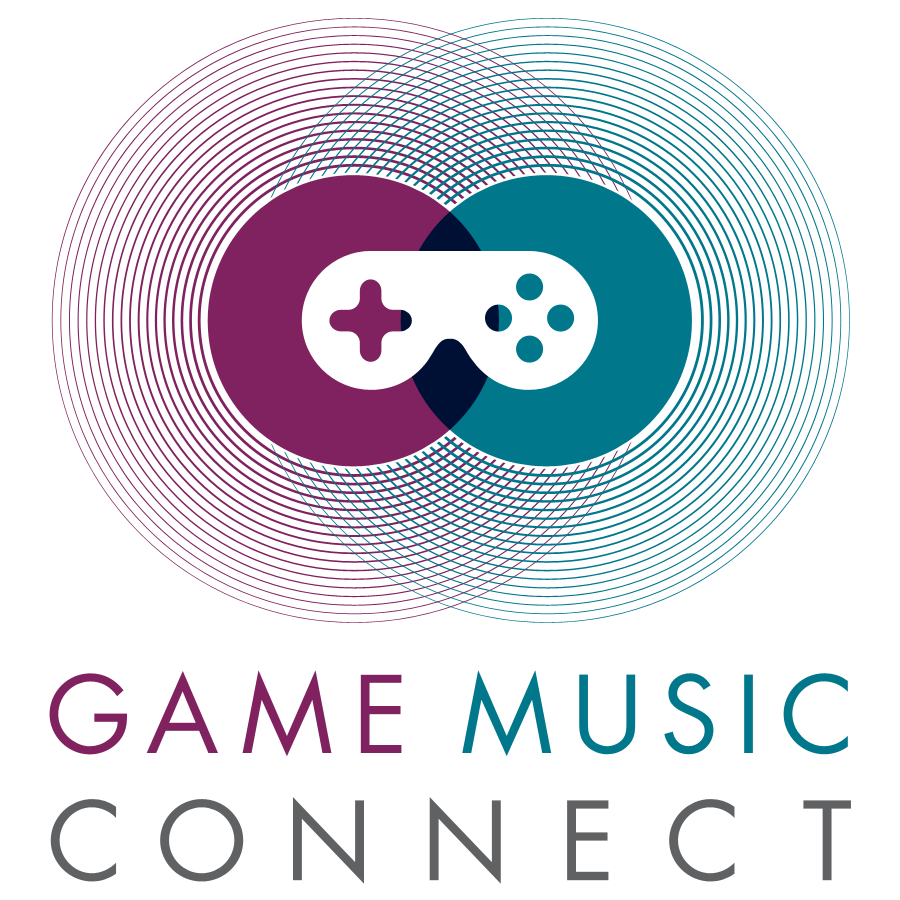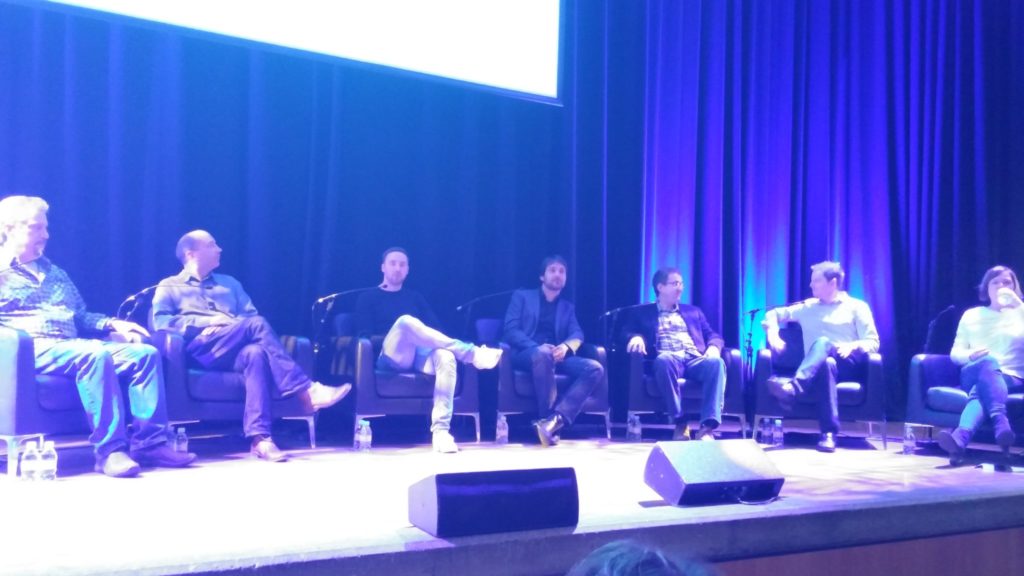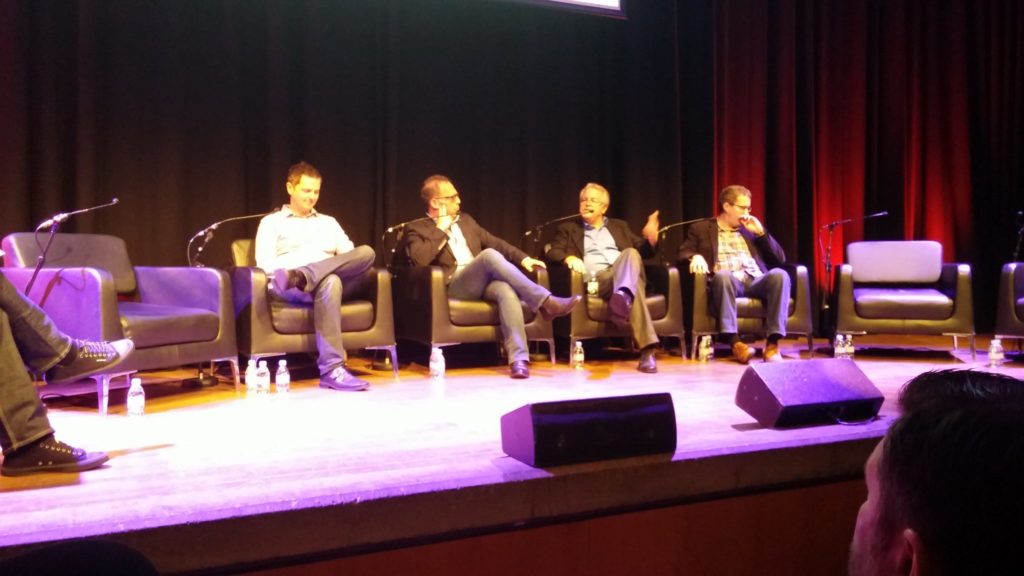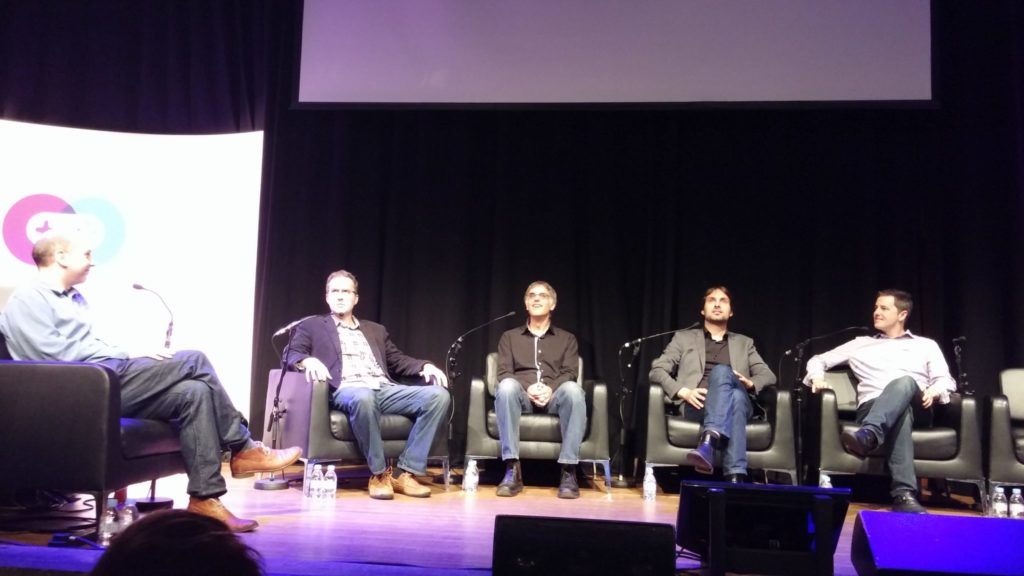Sam Hughes from The Sound Architect recently attended Game Music Connect 2014 on Wednesday 24th September. This is a fantastic event where professional composers discuss their careers and techniques to give advice and an insight into the world of video game music composition. Fantastic for composers of all levels as well as fans of video game music who want to understand more about the area. Visit www.gamemusicconnect.com for more info on this prestigious event.
Sam recounts highlights from the day below:
A whole year has passed since Game Music Connect 2013 and I can’t believe how fast it’s gone! If you want to read my review of last year’s event click here: Game Music Connect 2013. What I CAN believe is how much this event is growing both in popularity and its support. This year they had many high profile organisation supporting them. These include: BAFTA, Classic FM, COOL Music and Audiokinetic were amongst many others.
Before I recount the fantastic day, here is a list of speakers who attended this year’s Game Music Connect, to give you an idea of the amazing creative minds we were listening to (Alphabetical Order):
Darell Alexander – CEO of COOL Music Group (Beyond: Two Souls, Halo 4) – @COOLMusicLtd
Simon Ashby –Audiokinetic (Wwise) – @sashby21
John Broomhall – Host, Co-Founder and Audio Director (Forza Motorsport 5, X-COM, Transport Tycoon) – @JohnBroomhall
Jessica Curry – Composer and Co-Founder of The Chinese Room (Dear Esther, Amnesia: A Machine For Pigs, Everybody’s Gone to the Rapture) – @jessicacurry2
Olivier Deriviere – Composer of Remember Me, Assassin’s Creed: Black Flag Freedom Cry and many others – @oderiviere
Jason Graves – Composer of Tomb Raider , Dead Space series, – @jgmusic
James Hannigan – Co-Founder , Composer, Director of Game Art Connect (Harry Potter, Transfomrers Universe, Dead Space 3) – @James_Hannigan
David Housden – BAFTA Nominated Composer (Thomas Was Alone, Volume) – @DavidJHousden
Richard Jacques – Composer (James Bond 007: Blood Stone, Mass Effect, Little Big Planet 2) – @Richard_Jacques
Nick Ryan – Multi award winning composer, sound designe, artist and audio specialist (Papa Sangre, The Nightjar) – @musicandsound
Steve Schnur – Worldwide Executive and President of EA Music Group – @EA
Garry Schyman – BAFTA Award Winning Composer (Bioshock Series, Destroy All Humans!, Dante’s Inferno) – @Schymusica
Bear in mind that although it was a fantastically full day, I’ll be covering the highlights as there was so much great information. To experience all of it, you’ll have to come to Game Music Connect 2015!
Welcome
The day began with a warm welcome and a series of thank-yous from Co-founder, John Broomhall (including a shout out for myself, which I was very proud of), before leading onto the opening talk from Steve Schnur…
Opening Keynote: Steve Schnur – The Class of 2018
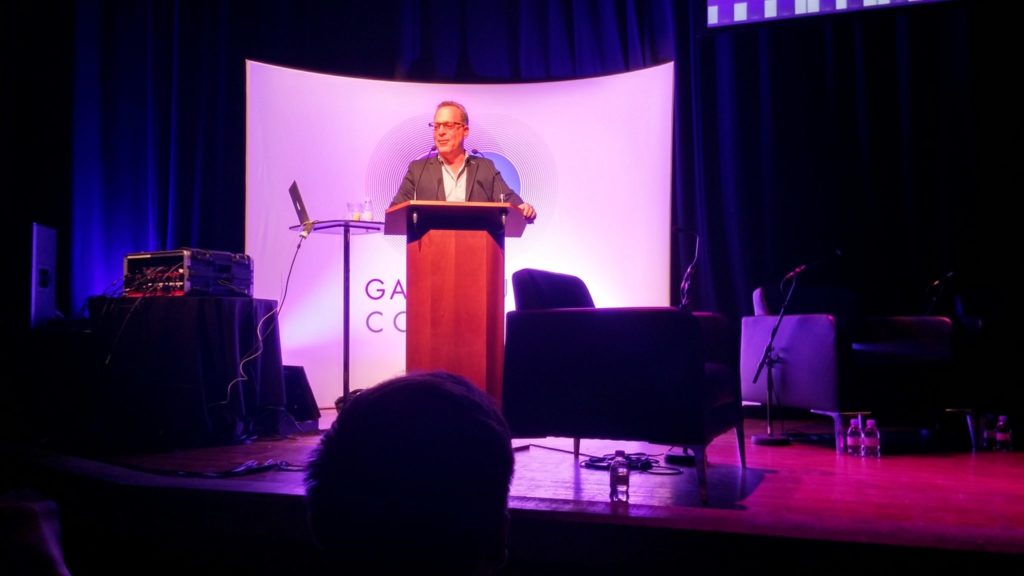
Steve opened his talk by playing songs on his phone to us that reminded him of fond memories. This was to remind us of the emotional connection we have with music. Steve goes on to state that for an entertainment medium to be “emotionally engaging, music is needed”. I couldn’t agree more. Though many other aspects must also be considered, music is a key tap into our emotional psyche and needs to be highly valued.
A scary thought that he planted in our heads is that there are over 147 million 14 year olds who are the class of 2018. Now these 14 year olds will never have known life before the internet, Xbox, iPhones etc. Yeah. How old do you feel now? (Unless you’re one of those 14 year olds, then google what life was like!). How strange is it to even consider not knowing these things? However, it is an important idea to remember when designing games and writing music for them.
Steve then went on to discuss how EA believes in supporting new artists, using as many new artists as possible for their games such as FIFA and MADDEN. Apparently 95% of their music is new from new artists. What may not have been considered is the exposure these artists get from these games. You think about the last time you played FIFA (If you play it). How many times have you heard those songs? That’s a lot of play time, for very little effort.
One thing that Steve was most passionate about was live musicians. He went on a self-titled “rampage” about how a live orchestra should always be used whenever possible and that there is no substitute. Apparently 54% of game music is mostly virtual samples and he believes that there is a better emotional relationship on a deeper level with live musicians. Now, this is an area for much debate. I agree that live musicians are incredible and when a piece is composed with live musicians in mind, then it does reach deeper when listening to them play and many games would have benefitted from the increase in budget and memory allocation. For example, listening to Distant Worlds or similar live renditions of Nobuo Uematsu’s infamous Final Fantasy soundtracks is just phenomenal. However, there are so many reasons that may lead to not using live musicians. Firstly, there are many fantastic electronic soundtracks, which can be created without the use of live musicians and they are not always the best route. This is especially true when writing parts that sound great but are physically impossible for players to perform live. This is also true for when it becomes ridiculously expensive, say you have ten drummers. You won’t want to pay for ten drummers at once, or to pay the same drummer to do it the same ten times. You’ll just record them once and then duplicate it again. The argument here from most would be that it’s still better than drum samples.
Regardless, this is only the first talk so I won’t go on any further! This is a debate for another day. Have some comments or opinions on the use of live musicians? Drop me a line!
Meet the Composers
I have to admit. I’m a bit out of the loop on “Indie” games, which is a very loose name these days, so I don’t know many of them. However this beautiful music came on as we watched a composer video, and I thought to myself I have to play this game. The game turned out to be Dear Esther from The Chinese Room. The music was composed by Jessica Curry, who is the co-founder and full-time composer at The Chinese Room. It was really powerful if you haven’t listened to/played it yet I recommend you do so!
This led us nicely onto the Meet the Composers panel. On this panel, chaired by John Broomhall, were the following composers:
Jessica Curry, Garry Schyman, David Housden, Olivier Deriviere, Richard Jacques, Jason Graves and James Hannigan.
Inspiration
After discussing their key projects the first question discussed was where they drew their inspiration from. I find this is always a fantastic topic of discussion as everyone draws their inspiration from different places. In fact, I even asked the speakers last year this very question as part of an article for the IGDA which you can read here: Hearing the Inspiration (http://newsletter.igda.org/2013/10/31/hearing-the-inspiration/).
Various different answers were given but they all centred around emotion and maintaining a strong relationship with the developer. Emotion is, for good reason, a very common theme when discussing composition of music and for good reason. Emotion is what gave us the inclination to write music and songs in the first place and without emotion there is no music.
Jason Graves also mentions the emotional connection that the players need to feel. Though he also mentions that a good hot shower is where he gets his eureka moments and helps him think about his music!
Key Skills and Knowledge
The next question was regarding the key skills and knowledge needed to make it as a composer.
Jason Graves’ approach is simple but great; think of yourself as the player and add a dimension to the game by thinking of it from their perspective.
Olivier’s point is also very essential to remember. Understand from a technical side of view, what it takes to make a game, not just the music. What is gameplay? Thus, agreeing that you have to be a player also.
I found Garry Schyman’s answer very interesting. Ken Levine was very adamant he didn’t want “Film Music”. He would say if something was “Too much like Film Music”. He understood that music for games is very different and Garry rightfully says that you need to realise that.
Jessica Curry’s experience was very interesting, as she creates the music first and then concept art is derived from the music. I love that! I think that’s a fantastic idea. Obviously it isn’t always appropriate to work that way but I would love to see a game made that way.
I fully concur with Jason Graves that music is an integral part of a game’s design and that the idea of “Audio as an ‘add on’ in games, needs to end”.
Score to Studio
After a quick break, we saw a fantastic video before the next talk, demonstrating David Housden’s next project: Volume. Another good one to check out!
The idea of this panel was to reveal the behind the scenes of the whole process, as opposed to the glamorous lifestyle, of writing the music for games. Chaired by John Broomhall again, this panel included Jason Graves, Darrell Alexander, Steve Schnur and James Hannigan.
One of the key issues discussed here is a popular debate, the trouble of Non-Disclosure Agreements (NDAs). With NDAs there is no information about current projects and what people are working on. With films, you can see it on IMDB almost instantly once it’s confirmed to be made. SO why do we have NDAs?
According to James Hannigan, it stems from the fact that the games industry grew out of the computer industry, where everything was very secretive. I can understand this however they all agree that the games industry needs to be less enigmatic and aid the industry by being more open with their products. I do understand the technology side though with consoles and products such as Project Morpheus etc. People don’t want their ideas stolen and some games are very innovative with that side of things, so who knows where we’ll go. What’s your point of view on NDAs?
For another short break we were shown the composer video for James Hannigan, demonstrating an amazing soundtrack for Transformers: Universe.
The next issue discussed was “Should I get an agent?” This is a very common question for composers and it was great to hear it from both the agent’s side and the composer’s side. The whole panel were in strong agreement that an agent is a good way to go as they do a “better job at representing composers and composers need someone to look out for their best interests” – Steve Schnur. I can see how it helps when, for example, working and friend relationships become combined there is no argument over things when there is an agent dealing with the situation. They did also advise that you need to be somewhat established before you get an agent, and actually have some credits to your name. You can’t just graduate at University and say “I’m a composer get me some work” to an agent, it has to be a mutually beneficial relationship. Jason added that you shouldn’t expect an agent to get you work, that’s not their sole purpose. They vet the work that comes in and the most important phase is during the contract negotiations.
So “How to get on an agents/executives radar”. Some advice from Darrell was to make sure you get out there and go to events like GDC, make sure you’re raising awareness of who you are, what you do and your work.
I did find it refreshing that they all hated the idea of pitching for gigs. They’re “dead against it”, because the pitch is not a good example of what the composer can do. For example a great composer who’s busy will throw a pitch together in half an hour and it won’t be a great piece of work. Whereas an unemployed composer will have a lot of time on their hands and will put the time and effort into creating a fantastic piece of work. However, further down the line they might realise that the other composer was better for the job and have to switch.
Indie Games: Revelation or Renaissance?
Before diving into this hot topic, we were shown another composer’s video of what I thought was a cool little game entitled Harold, with great music by Olivier Deriviere.
Another John Broomhall chaired panel including:Jessica Curry, Nick Ryan, David Housden, Olivier Deriviere, James Hannigan.
The key question that I found interesting from this discussion was “What makes an Indie game?” They voiced the concerns that I’ve had for a long time about indie games. Why are they classed separately? Why aren’t they games like any other? I understand that it stems from independent developers but when they grow when do they stop being indie developers? The word “indie” is thrown around a lot these days but I don’t feel it’s necessary any more. As Jessica says, with them now working on a title for Sony does this mean they’re no longer an indie developer?
It starts to get questionable and ends up making things overcomplicated. I don’t think it should matter whether it’s an indie game or not. It should matter whether something great has been created and is a fantastic game. That’s my opinion anyway, I’ve always been biased against having to define things too much, but enough of my soapbox!
According to the composers there is more freedom with indies than working on AAA titles, which makes sense as there are less people to answer to and less financial, marketing etc. issues to get in the way. Jessica did point out that she thinks it gets difficult to stay hungry when you’re successful and it must be easy to get complacent.
Game Music React – Interactive Music
A composer video of Richard Jacques’ work on 007 Blood Stone demonstrated some great use of original music for the James Bond franchise.
Being a sound designer and technology geek, this was my favourite section. I love hearing from behind the scenes how the music was implemented and how they used different techniques to make the music react to certain player interactions.
Chaired by Richard Jacques, the interactive music section included: Jason Graves, Simon Ashby, Olivier Deriviere and James Hannigan.
The talk began with a retro example from Richard. He demonstrated that even back in Jet Set Willy on the Atari, there was an interactive soundtrack. The music would gradually become more and more atonal as you lose health, until it became a horrendously horrible to-listen-to soundtrack.
One of the most interesting parts of this talk was the level developer in Little Big Planet 2. The detail players could go into was amazing. With the audio they could place sound areas so that the music would change depending on where they were in the level. Things like this really help people to buy authentic xanax understand how games work and how the mechanics have to be taken into consideration when thinking about the audio. For me, I would have loved that and thinking back, I wish I had played with level designers much more when I was younger!
James Hannigan’s demonstration of Republic was surprising, considering how long ago it was. The soundtrack transitioned between different times of day, intensities and location. For its time that was incredible. Even now it’s great when a game does that.
The differences in middleware over the years were fascinating to see. When hearing and being shown how much they used to have to do to accomplish what we can do so easily now, it really makes you grateful for the technology we have (however unreliable it may seem to be sometimes).
Simon went on to display Wwise and its current features for implementing game audio. Focusing on the mechanics of the software, his discussion was great for composers to understand the way they have to get their music to work with the games themselves.
Olivier Deriviere was very passionate about learning the meaning of interactive music and how it reacts to player input. To understand the opportunities for freedom of musical expression, where the technology enables the developer to do whatever they want with the triggers. This is the side where you really have to have a strong connection with the developer, because they won’t necessarily think of things from an audio or music perspective. You have to ask them if the music can do particular things at certain points and then they are able to implement it in the code.
Jason Graves continued to reinforce the importance of the interactivity of game music, as well as highlighting the need for layers of different stems. He discusses how we need to move away from loops now that we have the power and make sure that we avoid repetition. Jason commented on his work on Evolve, stating how there are 100s of stages triggered by user interaction.
I feel this was possibly the most important section for composers to hear. It’s nice to think of just writing music, sending it off and getting paid. With game music it’s much more than that. It’s not all just glamour. You need to get tech savvy and understand the why, how, and where. So get out there and learn the middleware or spend some time with developers!
Interview with Garry Schyman
This was a great one on one session between John Broomhall and BAFTA Award-Winner, Garry Schyman. Garry was such a humble professional who was just happy to be recognised for his art, and was very happy to share his experiences and advice with us.
Garry gave us an insight into his works on the Bioshock series, working with Ken Levine, and his journey into composition. There’s no point me going into elaborate detail here as it’s not the same as hearing from the man himself.
I was very happy. Even though the focus was on his work on Bioshock, I managed to ask him about his fantastic soundtrack for Dante’s Inferno and where he drew his inspiration from. I feel the soundtrack for the game is overlooked far too often and should be explored more.
Crosstalk
The crosstalk is what most people were waiting for all day. All of those burning questions that arise throughout the day are thrown at the composers in this section. The only downside to this section is that there is never enough time to ask all of the questions you want. There is always a chance to chat to the composers after the event however, which is the nicest thing about this event. No-one is too arrogant to stay after and chat with the fans/composers/enthusiasts.
Afterwords it was great speaking with the composers further.
Here is a great video over at Classic FM chatting with the speakers, plus I even make a quick cameo! (Looking terrible)
Full article here: http://www.classicfm.com/concerts-events/game-music-connect/news/interviews/
Final Thoughts
Game Music Connect 2014 followed on from its previous success exceptionally well, providing even more valuable information for game music and game audio enthusiasts and professionals. I could write all day about this event and I really wish I could but any more words and you’ll probably switch off ;)!
So that’s all from me about Game Music Connect 2014, I’ll leave you with these final words for BAFTA Award-Winner Garry Schyman:
Hope you enjoyed the article! If you ever want to chat gameaudio catch me on Twitter: @samhughes88
Fore more information on this fantastic event click here: Game Music Connect for more information.
See you at Game Music Connect 2015!
Article by Sam Hughes
Uploaded 30/10/14
Although I am employed within the game industry, all of the opinions I express through this website are my own opinions, given in a personal capacity, and do not represent my employer.


